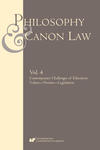Relevance of Kant’s Concept of Education for Civil Society
Relevance of Kant’s Concept of Education for Civil Society
Author(s): Zdzisław KieliszekSubject(s): Education, Ethics / Practical Philosophy, Civil Society, German Idealism
Published by: Wydawnictwo Uniwersytetu Śląskiego
Keywords: Immanuel Kant; civil society; upbringing; education; morality;
Summary/Abstract: The article presents Immanuel Kant’s concept of education for living in a civil society. The author also characterizes the reality which is hidden under the term “civil society.” In addition, the current challenges in the organization of the civil society are presented. On the basis of the analyses, the author reaches three conclusions. First of all, Kant’s concept is extremely valid. According to the author, the thought of Kant inspires to work out solutions to effectively face challenges, which have the stakeholders seeking to build civil society. Second, Kant aptly pointed out that the possibility of building a civil society directly depends on proper upbringing and education of next generations. And thirdly, Kant’s suggestion to create a “catechism of the law,” which would be helpful in shaping the next generations, is worth to take into account in the current debate on the future civil society. The author notes that by modern technological possibilities Kant’s suggestion could be implemented in the form of preparation of specific films, multimedia materials, etc., whose content could shape desirable attitudes in people.
Journal: Philosophy and Canon Law
- Issue Year: 2018
- Issue No: 4
- Page Range: 101-115
- Page Count: 15
- Language: English

